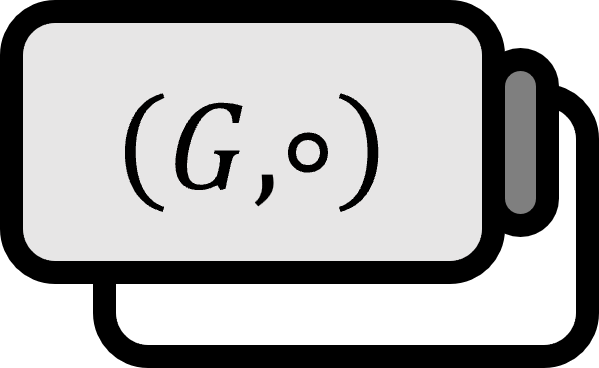Proof of the First Isomorphism Theorem
Theorems 1
Let $G,G'$ be a group.
- First Isomorphism Theorem: If there exists a homomorphism $\phi : G \to G'$, then $$ G / \ker ( \phi ) \simeq \phi (G) $$
- Second Isomorphism Theorem: If $H \le G$ and $N \triangleleft G$, then $$ (HN) / N \simeq H / (H \cap N) $$
- Third Isomorphism Theorem: If $H , K \triangleleft G$ and $K \leq H$, then $$ G/H \simeq (G/K) / (H/K) $$
The Isomorphism Theorem refers to three independent theorems proved by the algebraist Emmy Noether.
- $\ker$ is the kernel.
- $N \triangleleft G$ means that $N$ is a normal subgroup of $G$.
Explanation

The First Isomorphism Theorem suggests that there exists an isomorphism $\color{red} {\mu}$ corresponding to the red part in the diagram. This implies that, in a group, by discarding unnecessary parts for $\phi$, only structures treating the kernel as a kind of ‘unit’ can be left.
Proof
Let $K : = \ker ( \phi )$. Define $\mu : G / K \to \phi (G)$ as $\mu (xK) = \phi ( x)$. Now, we need to show that $\mu$ is an isomorphism.
Part 1. $\mu$ is a function.
For the identity elements $x,y \in G$ and $G'$, $e'$,
$$ \begin{align*} & xK = yK \\ \iff & x^{-1} y \in K \\ \iff & \phi ( x^{-1} y ) = e' \\ \iff & \phi ( x^{-1} ) \phi ( y ) = e' \\ \iff & \phi ( x ) ^{-1} \phi ( y ) = e' \\ \iff & \phi ( x ) = \phi ( y ) \end{align*} $$ Hence, $xK = yK \implies \phi ( x ) = \phi ( y )$, so $\mu$ is a function.
Part 2. $\mu$ is injective.
By reversing the process from Part 1, since $\phi ( x ) = \phi ( y ) \implies xK = yK$, $\mu$ is injective.
Part 3. $\mu$ is surjective.
$\mu ( G / K ) = \left\{ \mu (xK) \ | \ x \in G \right\} = \left\{ \phi (x) \ | \ x \in G \right\} = \phi (G)$, thus, $\mu$ is surjective.
Part 4. $\mu$ is a homomorphism.
For $x,y \in G$, $$ \mu (xKyK) = \mu (xyK) = \phi (xy) = \phi (x) \phi (y) = \mu (xK) \mu (yK) $$ therefore, $\mu$ is a homomorphism.
■
Generalization
Meanwhile, a theorem extending the First Isomorphism Theorem to rings is known. The method of proof is almost the same, except that unlike groups, both addition and multiplication operations are considered.
Fundamental Theorem of Homomorphism: For rings $R$, $r '$, if there exists a homomorphism $\phi : R \to r '$, then $R / \ker ( \phi ) \simeq \phi (R)$
Fraleigh. (2003). A first course in abstract algebra(7th Edition): p307~309. ↩︎
